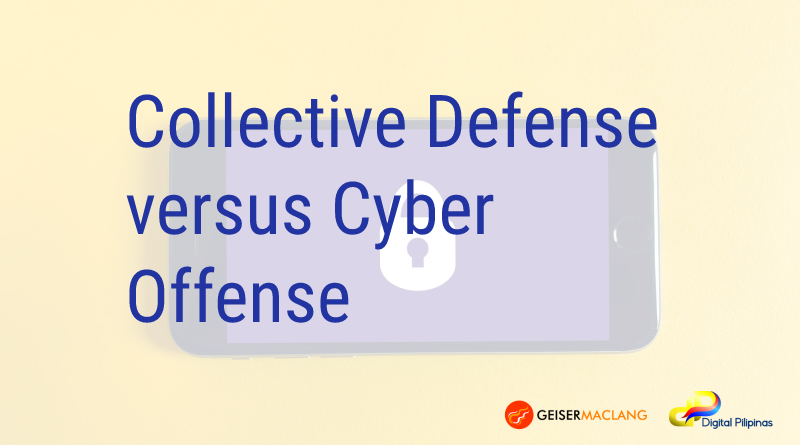CYBERCRIMINALS are again on the loose. These felons lurking on the web recently mounted another series of attacks—this time victimizing several customers of a leading bank, who posted on social media that their accounts were hacked.
Such alarming event clearly shows that even well-established organizations like Domestic Systemically Important Banks are not exempt from hacking and data breaches that can cost them huge financial loss and tarnish their good image.

If these illegal activities remain unabated, online theft will just continue again and again. Per the Philippine business associations’ estimate last March, their adverse effects on the economy could reach up to $10.5 trillion annually by 2025.
Concerned about this perennial problem, cybersecurity experts called for a collective effort to deter the unstoppable illicit acts of these offenders.
They agreed that a strong collaborative cyber defense among industry players themselves, including but not limited to government bodies, the banks, fintech firms, industry groups and consumer-driven communities, could mitigate if not totally end these cybercrimes.
Man-made crime
ONLINE attacks are being done by criminals who steal vital pieces of information from a state, an industry, an organization, a firm, and even an individual in exchange for a favor, which in most cases means money.
Elsewhere in the world, cyber felons operate unlawfully underground, compromising data of their target victims, with the help of their sophisticated technology and other tools.
In a recent webinar dubbed “Cybercrime: a Collective Defense,” Raymund Liboro, former commissioner of the National Privacy Commission (NPC), gave an overview of the situation that banks and other financial institutions face when it comes to cyber attacks.
“Highly technological heists and systematic attacks exploit vulnerabilities in human beings and the banking systems. It is not a question of whether a breach is possible—but rather when it will happen,” he said.
“Cybercrimes are man-made, so they can be prevented and mitigated. The NPC has a responsive regulatory framework and provides [organizations] data privacy resilience by giving correct advice, engaging stakeholders and mitigating risk,” he added.
Since these offenses are intentionally conducted by the bad guys, only the good ones can stop them.
Digital Pilipinas Convenor Amor Maclang identified the “new allies” that could counter the illegal undertakings of the Black Hat Hackers: “The White Hat Hackers” or cybersecurity professionals who employ the methods of online attackers to find flaws in a company’s system and then fix them, the “advocates of Open Finance, the academe, and media.”
Open system
A TRANSPARENT system is among the many ways that can protect anyone from becoming prey to predators hiding on the web.
According to Atty. Arvin Razon, director for legal compliance and regulatory affairs of Brankas, the rising threats posed by cybercriminals need an open environment where the industry players and their allies can discuss issues and come up with strategies to solve them together.
“All of us can adapt quickly and work collectively to close holes in the system that cyber criminals can exploit. We need to advocate for interoperability and collaborative partnerships in data protection,” he noted.
To help jumpstart these industry dialogues, Razon suggested Open Finance being a model of data-sharing that allows users to share their financial information, not necessarily from a bank, but also from other sources, with third parties.
Together with this, PDAX Chief Executive Officer and founder Nichel Gaba also recommended Open Banking, which enables both mainstream and non-bank financial institutions, as well as other third-party service providers, to get access to sensitive customer data via details of their online payment accounts.
For him, fintech systems like Open Banking and Open Finance can also help see to it that “finance institutions have a standard security measure.”
Nascent technology, likewise, can further develop industry transparency which can keep the cybercriminals at bay.
“Businesses use technologies to talk to each other using a common language. Tech has made it easy for us to do banking. Because we are more connected than ever, we have to work together,” Razon said.
At present, Gaba cited that “we have the tech to have [financial] products much more accessible. Crypto currency and blockchain are integral in helping make these products accessible and safe.”
Act like a community
BATTLING cybercrimes is not an individual’s fight or just by a few others. Just like the hackers who tend to band together in groups, creating a strong cybersecurity system takes a community effort.
“One thing is absolutely clear: we will only be stronger if we work together. Sharing our security issues will allow us to learn and adapt much faster. When one of us is victimized by cybercrimes, all of us are victimized. Collective security is not a field for competition, but for collaboration,” Maclang pointed out.
The whole industry must step up when it comes to its cybersecurity initiatives for its own protection and their customers who own tons of valuable data that are attractive to identity thieves and other digital invaders.
“Cybersecurity and cyber defense is a whole-of-nation, whole-of-society concern. Black hackers work in groups—can we survive their attacks as individual actors? But sharing security issues will allow us to learn and adapt faster. We will never be done when it comes to security as the world will change in increasing speed. We have to admit that we can’t do it alone,” she stressed.
